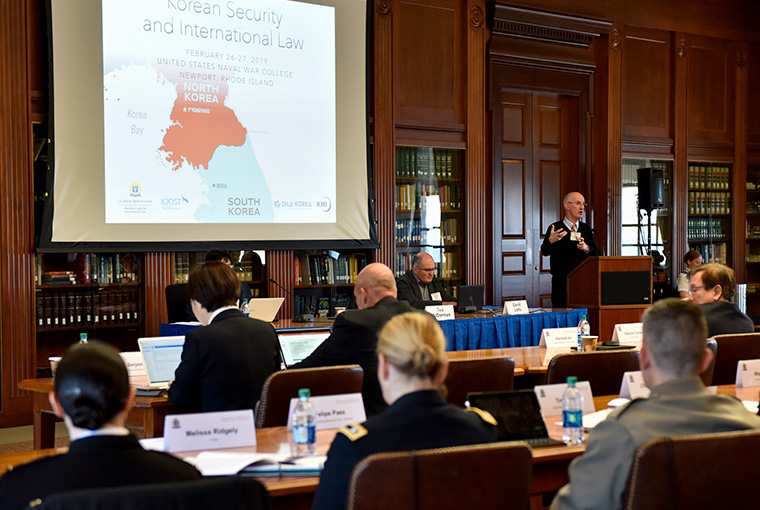U.S. Naval War College conducts international law conference on Korean security

NEWPORT, R.I. -- U.S. Naval War College’s Stockton Center for International Law hosted a conference Feb. 25-27 on the issue of Korean security – a long-planned event that happened to coincide with the U.S.-North Korea summit this week in Vietnam.
“There is probably no greater pressing security issue facing the world today than the security of the Korean peninsula,” college Provost Lewis Duncan told the group in his welcoming remarks.
“As the latest efforts in negotiating diplomatic solutions to the North Korean threat show, international law is central to the effort to establish regional security and stability.”
The Newport conference was co-sponsored by three South Korean research institutions: the Korea Institute of Ocean Science and Technology, Development of International Law in Asia-Korea and the Korea Maritime Institute.
“We are glad to contribute to the dialogue to explore practical solutions to these difficult challenges,” Moon Sang Kwon of the Korea Institute of Ocean Science and Technology said after the conference.
The event gathered international experts from academia, think tanks, government, nongovernmental organizations, members of the U.S. armed forces and representatives from foreign partner militaries.
“I have come to believe that foreign policy, security or defense ought to be based on international law, or scrutinized through international law, if it is to be more solid, justifiable and effective,” said Hantaek Im, professor at Hankuk University of Foreign Studies and former South Korean ambassador to the Geneva Conference on Disarmament.
“Undoubtedly, it is a rare and interdisciplinary attempt for eminent scholars of political science and international law to meet together, exchange and combine their unique perspectives,” Im said during his opening remarks.
James Kraska, chair of the Stockton Center, said the conference’s goal is to explore the relationship between the legal and security dimensions in Korea.
“International law is the language of diplomacy,” Kraska said between sessions.
“We’re looking at not just resolving the Korean situation or unification issues, but also managing the security dynamic -- however it unfolds. We need to better understand how international law applies,” he said.
The conference explored the application of international law to arrest the North Korea nuclear program, legal aspects of countering proliferation of weapons of mass destruction, how to contend with mass migration at sea if the regime collapses and rules for use of force in the event of a Korean contingency action.
Patrick Cronin of the Washington, D.C.-based Hudson Institute told the audience that the Korean peninsula could be at a genuine pivot point.
“We could be at a point where the geopolitical posture of Northeast Asia is in flux,” Cronin said in the Feb. 26 keynote address. “This really hasn’t happened really since this long Cold War that we’ve been in since 1953 set in.”
However, he added, history shows that major change would be difficult to achieve.
“Previous attempts at rapprochement and détente have failed,” said Cronin, who is the Hudson Institute’s chair for Asia-Pacific security.
Retired Adm. Tomohisa Takei, chief of staff of the Japan Maritime Self-Defense Force from 2014 to 2016, spoke about trilateral cooperation among the United States, South Korea and Japan. Takei current serves on the Naval War College faculty.
Observing current political tension between Japan and the Republic of Korea, Takei said, "Although the sea separates two countries geographically, the sea can tightly connect navy-to-navy relations without a big effort because two navies share the sea as a common infrastructure for daily operations."
Organizers said that scholarly articles from the conference will be published in future volumes of International Law Studies, the Stockton Center’s international law journal and the oldest journal published by the college.
